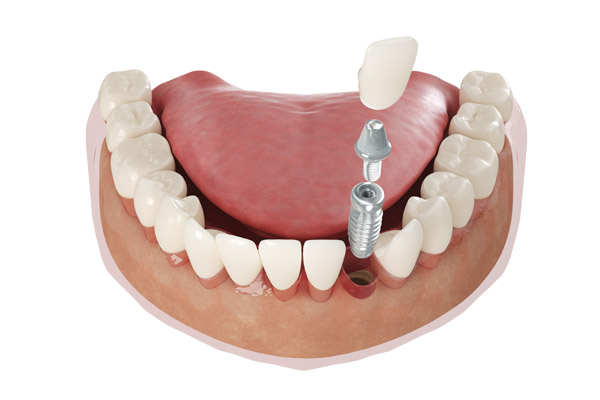 Many patients who have missing teeth consider dental implants as an option to restore the look and function of their smile. When deciding whether to have the procedure, it is important to learn as much as possible about the treatment.
Many patients who have missing teeth consider dental implants as an option to restore the look and function of their smile. When deciding whether to have the procedure, it is important to learn as much as possible about the treatment.
4 things to know about dental implants
There are a variety of things patients should know about dental implants when considering the procedure.
1. There are different kinds of implant procedures
Dental implants come in two types and three sizes. Endosteal implants are the most common type. An implant screw, dental prosthesis, and a connector piece are the components of this type of implant. They come in standard, wide and mini sizes. Wider sizes are used for restoring molars and mini sizes are employed in tight spaces or with patients who lack the bone mass to support larger implants. Periosteal implants are made from a metal framework that is placed under the gums and on top of the jawbone.
2. Implants require dental surgery
Dental implants require dental surgery to place the posts in the jaw. Before the surgery, your dentist will take X-rays and perform a cone beam computed tomography scan to use in creating your treatment plan. During the procedure, the dentist removes any damaged or decayed teeth and then makes a small incision in the gums to expose the jawbone.
Next, the dentist shapes the tooth socket to prepare it for the implant screw. The dentist then places the implant in the jawbone and attaches a connector piece that will hold the replacement tooth. The dentist then moves the gums back into place and closes the incision with stitches. The dentist may attach a temporary restoration to the connector piece.
3. Dental implants require patient commitment
The jawbone must bond with the implant before the final restoration can be attached to the connector piece. This process usually takes three to six months. During this time, the implants are susceptible to damage because they are not strongly anchored into the jaw. Patients must follow their dentist's instructions during the recovery period to avoid complications, such as implant failure. Keep the implant site clean, follow the recommended daily hygiene routine, and eat soft foods during the recovery period.
4. Dental implants require a larger upfront investment than other restorations
Patients should be prepared to pay more for dental implants than other types of restorations. However, because implants are more durable, they may be more affordable over the lifetime of the treatment. Other restorations may need to be replaced. Dental implants can last a lifetime. Additionally, because implants help patients avoid bone loss, they may save the patient money on future dental treatments.
Conclusion
The more you learn about dental implants, the better prepared you will be for the procedure. Talk to your dentist about what you should know about the procedure and be sure to ask questions about anything you do not understand or are concerned about.
Request an appointment or call Precision Smiles at 201-204-1355 for an appointment in our Hackensack office.
Recent Posts
Many people in the United States have dental implants, but that does not change the fact that misinformation about the procedure still runs rampant. Check out these myths and facts about them to help you determine if implant surgery is right for you.There are many myths about implants. Learn about the myths and the facts…
For many people, dental implants can be a permanent solution for dealing with lost or damaged teeth. This type of treatment is designed to last a lifetime. Once it is complete and healed, patients can enjoy a more beautiful smile without having to worry about any dietary changes, difficult home care, or unnatural-looking teeth.Dental implants…
Losing a tooth can be uncomfortable in many ways, and dental implants might be the solution you are looking for. When you are missing a tooth, you may not like the look of your mouth, and you may have difficulty chewing. Dentures and bridges are options for you, but if you want a permanent answer,…


